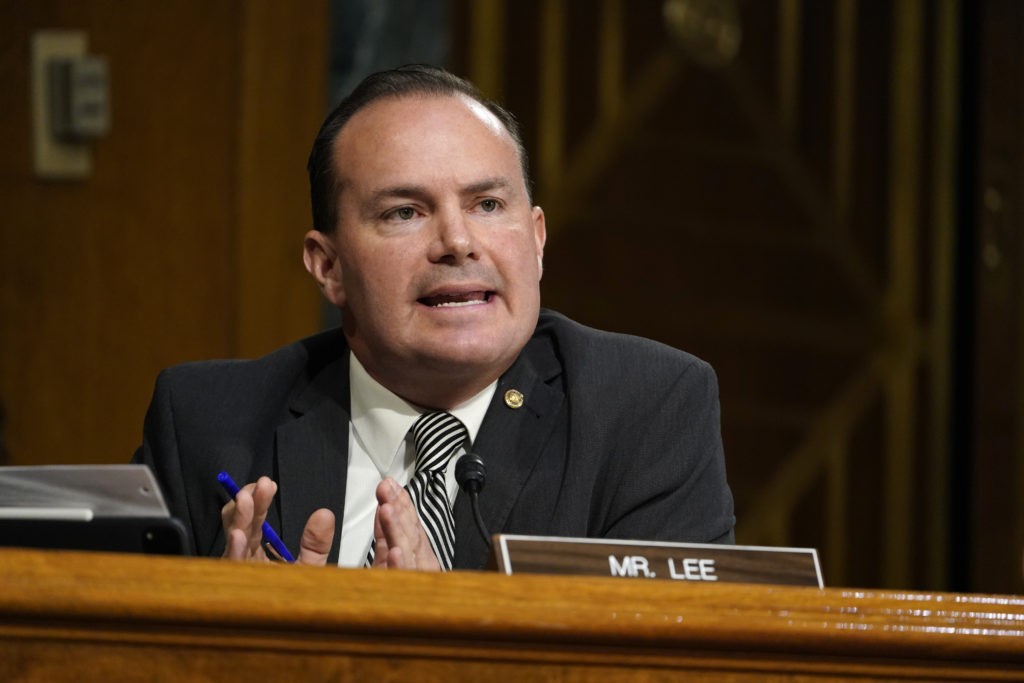
DRAPER, Utah (AP) — Two Republicans took aim at a politician known as one of former President Donald Trump’s most devoted allies on Wednesday, attacking incumbent Sen. Mike Lee and working to convince voters that one of Washington’s more polarizing figures may not be ideal for voters in one of the country’s most conservative states.
At a GOP debate held at a suburban Utah middle school, Lee presented himself as a steadfast opponent of abortion, gun control and President Joe Biden. The two-term senator said he has worked to rein in the size of the federal government and defend the U.S. Constitution.
Though the audience took little issue with his platform, as the incumbent and presumptive frontrunner, Lee weathered a barrage of criticism from Ally Isom and Becky Edwards, the two candidates challenging him in Utah’s upcoming primary election.
“You’ve stayed too long in Washington when you forget who sent you there; when you can’t pass bills; when people refuse to work for you,” Isom, a one-time staffer of Gov. Gary Herbert, told an applauding audience.
While Lee appealed to party unity and mostly refrained from attacking either opponent, both Isom and Edwards attempted to strike a delicate balance at the debate, drawing enough distinction between their candidacies and Lee’s while avoiding appearing overwhelmingly negative or staking out positions that could alienate potential supporters.
“We have a president who’s making it — from gas to groceries — more expensive, and he wants to pile on more and more federal regulations. What we need in this moment is to make sure that we send a Republican majority back to the United States Senate this fall,” Lee said.
Isom on Wednesday attempted to present herself as a governing conservative and an alternative for voters who see Lee as divisive and obstructionist for his frequent votes against bills that win support from other Senate Republicans.
Edwards, a former state lawmaker, described Lee as an embodiment of Washington’s political dysfunction. She distinguished herself with appeals to bipartisanship and more moderate positions on key issues. And at times on Wednesday, she even criticized Trump, who won by more than 20 percentage points in 2020. Without mentioning him by name, she rebuked Trump for casting doubt on the integrity of the election, both before and long after it was over.
“That was deeply concerning to me,” she said.
The 2020 election has emerged as a Senate race issue since text messages between Lee and former chief of staff Mark Meadows were published by CNN. The messages showed Lee communicating with Trump’s team in the lead-up to Jan. 20 and referenced his communication with swing state lawmakers mulling whether to send Congress elector slates in line with vote counts.
Lee repeated the defense he’s provided since the release of the texts, reminding critics that he ultimately voted to certify the results.
In the wake of the leak of a draft U.S. Supreme Court decision that would overturn Roe v. Wade, Isom and Lee both described themselves as anti-abortion. Edwards said she would have preferred the court not revisit the case but, if elected, she would not vote to codify it.
All three candidates said they sympathized with those caught in what they acknowledged was a broken immigration system. Edwards and Isom said they supported efforts to streamline pathways to citizenship for immigrants already in the U.S., while Lee said he saw little chance for reform amid a crisis he blamed on Biden, who he called an “open borders president.”
Utah is among the country’s most conservative states, yet has historically stood out for unique political dynamics stemming from The Church of Jesus Christ of Latter-day Saints, of which a majority of state residents are members.
The state has diverged from Republican orthodoxy with moderate positions on issues such as immigration. In 2016, a third-party candidate won so much of the presidential vote that Trump only won a plurality. And in 2018, Mitt Romney — among the GOP’s staunchest Trump critics — won a U.S. Senate seat with overwhelming support.
Though Isom and Edwards both made their opposition to some of Lee’s votes and rhetoric clear, neither attacked him scathingly by name, holding fast to the state’s unfailingly polite political culture.
The debate showcased how this year’s Senate race — and whether Utah decides to stick with a senator known widely as a Trump-aligned hardliner — will reflect the extent of shifts underway in the Republican Party. The election will test the durability of the former president’s support as well as whether attacks on Lee’s lightning rod reputation resonate among voters.
The winner of the state’s June 28 primary will take on independent candidate Evan McMullin, who won the Democratic Party’s backing at its April convention.
___
This version corrects that the debate was held at a middle school, not a high school.




